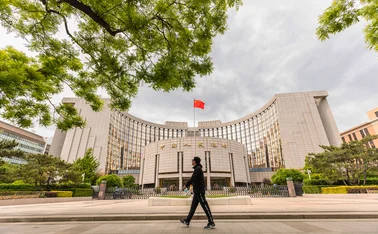
Foreign exchange dealer of the year: HSBC
HSBC has helped clients to shift out of euro assets and into the renminbi

When the People's Bank of China (PBoC) opened up the country's interbank bond market to central banks in July, one banker described it as a "huge step" that "basically puts China's interbank bond market on the same level as other markets".
But how was not exactly clear. "The PBoC's official statements are typically pretty vague," says Michal Zajac, head of investment strategy at Bank of Slovakia, which is looking to invest in China. "Specific questions – whether derivatives transactions are included, what kind of regulation central banks should follow if they wish to trade in the repo market – were not answered in July."
Instead, new details "arrive every week, piece by piece" – a never-ending stream of statements and regulatory tweaks, usually in mandarin Chinese, which need to be deciphered and considered. "The knowledge of private actors helps a great deal," he says.
Zajac says he uses three financial institutions to make sense of the changes in China. Two are "willing to talk and share information", but the third stands out. HSBC "is very proactive", he says. "They deliver the best information and are actually pushing us forward."
China's financial market reforms and the International Monetary Fund's (IMF) related decision to designate the renminbi a special drawing rights currency are two of the biggest foreign exchange stories of the past year, and are likely to have major future implications for world markets and central banks. "It's all changing very quickly," says Christian Deseglise, head of central banks, sovereign wealth and public funds financial institutions group at HSBC in London. "It is a very big deal for the international monetary system and we want to be at the forefront of this."
It is easy to see why. Central Banking Publications' most recent Reserve Management Trends 2015 (RMT) survey, published in April 2015, showed 51 reserve managers responsible for $2.7 trillion in assets believe the renminbi will account for at least 10% of global reserves in 10 years' time. In fact, between 75 and 80 central banks are already invested in the Chinese currency, but amounts typically remain small. The last year's advances are expected to change that.
"There's been a voracious appetite from central banks for information and advice since July," says Bernard Altschuler, senior coverage banker for central banks and reserve managers at HSBC in London. The bank's strong presence in China makes it well-positioned to meet that demand; it is one of only four foreign commercial lenders allowed to act as settlement agents for renminbi transactions in the country. Moreover, it acts as a qualified foreign institutional investor (QFII) custodian to eight, or half, of the sovereign, supranational and agency entities currently invested in China.
"Their expertise and in-depth knowledge of Chinese markets stands out," says Diego Indarte, head of investments at Central Bank of Uruguay, who, speaking in a personal capacity, praises the bank for its expertise in many other markets. "They realise the many challenges faced when dealing in new markets and they have played an essential role when expanding our reserves portfolio into non-traditional currencies."
The euro and alternatives
But the renminbi's ascent is not the only trend of significance to reserve managers during the past year that HSBC has turned into a competitive advantage. The bank has also been an active counterparty to central banks rebalancing their euro exposures, both by selling cash and through derivatives transactions.
Six out of 10 respondents in the RMT survey said they had made changes to their asset allocation as a result of negative rates in Europe, with just under half of those signalling a reduction or exit from euro-denominated assets. "We've seen substantial moves out of euro from a wide range of central banks," says Deseglise.
HSBC has also played a major role in helping central banks move into higher yielding currencies. The bank has also helped a number of central banks in Europe and Latin America to execute their first trades not just in renminbi but also Hong Kong dollars, Korean won and Singapore dollars. "HSBC has been a highly relevant adviser for us, particularly in regard to the understanding of the Asian markets. They have been at the forefront of navigating new markets on the forex front," says Central Bank of Uruguay's Indarte.
The head of portfolio management at another, mid-sized Latin American central bank also praises HSBC's support in adding currencies, including Singapore dollar, Korean won, and offshore renminbi, to its reserve portfolio in the past year. "[The] inclusion of new currencies and accessibility to new financial markets [help our] portfolios benefit from increased diversification and alpha opportunities," the head of portfolio management says. HSBC helped explain the regulation and documentation needed to establish proper operational procedures, provided reports and research papers explaining financial markets in relevant countries, and helped with trial trades to test operational procedures, he adds.
Added to this are HSBC's residual strengths. It is a market-maker in 90 currencies, trading forex in more than 60 countries across all time zones with a primary dealer licence in the US. It has a deep and consistent pool of liquidity across a range of forex instruments – quoting in all tradeable currencies through electronic and voice channels. "HSBC has continuously received excellent reviews by our portfolio managers when it comes to pricing, response speed when quoting and research," says the portfolio head at the mid-sized Latin American central bank.
HSBC also provides individually designed training programmes on a regular basis to reserve managers and its forex specialists and coverage bankers regularly visit clients in person. This year alone, HSBC has held individual meetings with more than 50 central banks. "There's a bigger emphasis on training and research than ever before," says Altschuler, adding the aim is to engage reserve managers on a "strategic level, rather than just sending out information".
Finally, the bank's sovereign investor training programme, running for a week every year in Hong Kong, attracted 75 delegates from more than 50 entities in 2015. "On the decision-making front, they play an essential role through their extensive research and training," Indarte says. "Their strategic events, like the Hong Kong sovereign training seminar, address a wide variety of trending and innovative topics. It stresses the commitment and understanding of the sovereign community."
The Central Banking awards were written by Christopher Jeffery, Tristan Carlyle, Daniel Hinge, Arvid Ahlund, Dan Hardie and Rachael King.
Only users who have a paid subscription or are part of a corporate subscription are able to print or copy content.
To access these options, along with all other subscription benefits, please contact info@centralbanking.com or view our subscription options here: http://subscriptions.centralbanking.com/subscribe
You are currently unable to print this content. Please contact info@centralbanking.com to find out more.
You are currently unable to copy this content. Please contact info@centralbanking.com to find out more.
Copyright Infopro Digital Limited. All rights reserved.
As outlined in our terms and conditions, https://www.infopro-digital.com/terms-and-conditions/subscriptions/ (point 2.4), printing is limited to a single copy.
If you would like to purchase additional rights please email info@centralbanking.com
Copyright Infopro Digital Limited. All rights reserved.
You may share this content using our article tools. As outlined in our terms and conditions, https://www.infopro-digital.com/terms-and-conditions/subscriptions/ (clause 2.4), an Authorised User may only make one copy of the materials for their own personal use. You must also comply with the restrictions in clause 2.5.
If you would like to purchase additional rights please email info@centralbanking.com





